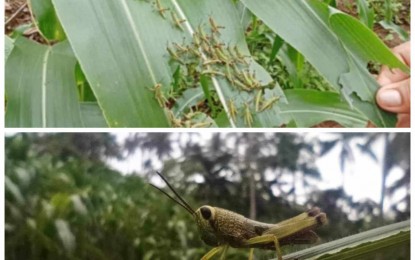
INFESTATION. Locust infestation has affected sugarcane and corn fields in Negros Oriental province in recent weeks. Agriculture technicians are undertaking containment measures, such as insecticide spraying and biocontrol agents, to prevent the spread of infestation. (Photo courtesy of DA-PATCO)
DUMAGUETE CITY – Agriculture technicians are stepping up efforts to contain the spread of locust infestation in sugarcane and corn fields in Negros Oriental province, a Department of Agriculture (DA) official said on Wednesday.
Alejandro Rafal Jr., DA-Provincial Agriculture Technology Coordinating Office (DA-PATCO) provincial chief, told the Philippine News Agency that locusts have infested farmlands planted with sugarcane and corn in the towns of Siaton and Pamplona.
“We have deployed all our personnel to the field now to undertake containment measures to ensure that the locusts cannot repopulate and invade other farmlands,” Rafal said.
Aside from spraying insecticides, the agriculture technicians are also introducing Trichogramma, an insect used as a biocontrol agent, in the sugarcane and corn fields to kill the locust larvae before they reach the pupae and adult stages, Rafal said.
The presence of an unusually large number of locusts was first reported in sugarcane plantations in Siaton about three weeks ago but the damage was minimal with five hectares infested.
Currently, the DA-PATCO is awaiting reports from Pamplona while monitoring other areas like Mabinay and Bais City which have vast lands planted with sugarcane.
Rafal said their objective now is to prevent the locusts from multiplying in huge numbers to form a swarm which can seriously damage crops. (PNA)
